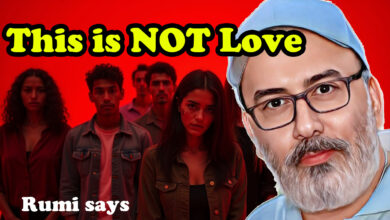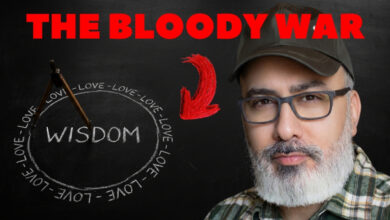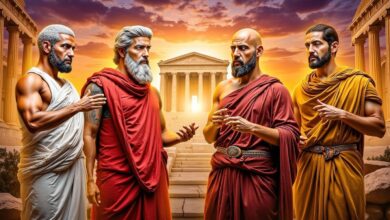The Soul’s Unraveling: A Rumi-Guided Journey into the Love That Tears You Apart to Make You Whole
Journey into the Love That Tears You Apart
In the vast library of the human heart, there is one word that occupies more volumes than any other: Love. We are born seeking it, we build our lives around it, and our art, music, and literature are saturated with its endless variations. We are taught to search for a love that feels like a safe harbor, a peaceful and comfortable shore where the turbulent waves of life can no longer reach us. We seek a love that completes us, that builds us up, that feels like coming home.
But what if this conception, as comforting as it is, only scratches the surface of love’s true nature? What if the most profound, transformative, and divine love you will ever experience does not feel like a construction project, but like a demolition?
Enter the world of Jalal ad-Din Muhammad Rumi, the 13th-century Persian poet, jurist, and Sufi mystic whose words have transcended the centuries to speak directly to the modern soul’s deepest longings. Rumi does not offer us a simple, comfortable love. He presents love as a cataclysmic force of nature—a fire that purges, a storm that shatters, an ocean that dissolves. He speaks of a love that doesn’t just hold you, but unravels you.
In a few short verses from his masterwork, the Masnavi, Rumi lays out a radical roadmap for spiritual transformation. It is a journey that begins with the violent tearing of our identity, passes through the healing of our deepest ailments, and culminates in the dissolution of the very ego that keeps us feeling small and separate. This is not a guide to finding a partner; it is a guide to finding God, the Beloved, by allowing love itself to become the sole actor in our lives. Today, we will walk this sacred path, exploring these verses not as mere poetry, but as a living transmission of a truth that can set us free.
While men whose clothes are ripped to shreds by love Are cleansed of greed like this to rise above. Be joyful, love, our sweetest bliss is you, Physician for all kinds of ailments too, The cure for our conceit and stubborn pride Like Plato here with Galen, side by side;
Let us take a deep breath, quiet the demanding voices of the world, and step into the heart of this mystery.
Part I: The Sacred Violence of Annihilation – “Ripped to Shreds by Love”
“While men whose clothes are ripped to shreds by love Are cleansed of greed like this to rise above.”
Rumi begins not with a gentle embrace, but with an image of utter destruction: “clothes ripped to shreds.” To understand the depth of this metaphor, we must first ask: what are the “clothes” we wear every day? He is not speaking of cotton and silk. He is speaking of the intricate, carefully constructed wardrobe of the ego.
The Wardrobe of the False Self
From the moment we are born, we begin to assemble this wardrobe. Each piece is given to us or chosen by us to define who we are in the world, to ourselves and to others.
- The Garment of Identity: This is perhaps the most fundamental piece. It is our name, our nationality, our family history, our gender, our profession. We say, “I am a doctor,” “I am an American,” “I am a Johnson.” These are labels we wear so prominently that we often mistake them for our actual skin. They provide a sense of belonging and definition, but they are, in essence, costumes.
- The Cloak of Reputation: This is the story others tell about us, a garment we spend an immense amount of energy curating. We want it to be woven with threads of success, intelligence, kindness, and strength. We polish it daily through our actions and our social media profiles, living in constant, low-grade anxiety about it becoming stained or torn.
- The Armor of Beliefs: Our political ideologies, religious doctrines, and personal philosophies are like a suit of armor. It makes us feel safe and certain in a chaotic world. It gives us a framework for what is right and wrong, good and bad. Yet, this armor can become so rigid that it prevents our hearts from being touched by anything that contradicts what we believe we already know.
- The Tapestry of the Past: We wrap ourselves in the stories of our past—our triumphs, our traumas, our heartbreaks. These stories, while an integral part of our journey, can become a heavy tapestry that we drag behind us. “I am the person who was hurt,” “I am the person who succeeded against all odds.” We identify so strongly with the narrative that we forget we are the author, not just a character.
The Arrival of Divine Love
Into this meticulously curated life, true Love arrives. Rumi’s love is the love of the Divine, the overwhelming force of Reality itself. This Love has no interest in our wardrobe. It is utterly unimpressed by our reputation, unconcerned with our job title, and sees right through the armor of our beliefs. It is a force of pure, undiluted truth, and its presence is like a blazing sun entering a room full of shadows.
This love does not gently ask us to disrobe. It “rips” our clothes “to shreds.” Why such a violent image? Because the ego does not surrender willingly. It clings desperately to its costumes, for it knows that without them, it will cease to exist. The experience is terrifying. It can feel like a profound life crisis: a job loss, a divorce, a health scare, or a spiritual emergency where the very ground beneath our feet disappears. Everything we thought we were is torn away. We are left naked, vulnerable, and utterly exposed. This is the annihilation of the false self.
The Cleansing and the Ascension
Yet, it is in this very state of nakedness that the miracle occurs. Rumi says that those who undergo this shredding are “cleansed of greed.” Greed, in the Sufi sense, is far more than the desire for material wealth. It is the ego’s insatiable hunger for more: more validation, more control, more security, more identity. When the clothes of identity are gone, what is there to validate? When the armor of belief is shattered, what is there to control? The hunger of the ego starves in the face of truth.
This cleansing is a profound purification. In the emptiness left by the annihilated ego, a new space is created. It is from this space of pure being, of simple, unadorned existence, that we “rise above.” This is not an ascension into the clouds, but an ascension in consciousness. We rise above the petty dramas of the ego, the anxieties of reputation, the prison of our own beliefs. We are liberated from the exhausting work of maintaining the false self. The love that felt like a destructive force is revealed to be an act of supreme grace—a violent liberation that tears down our prison walls so we can finally see the open sky.
Part II: The Medicine of Being – “Physician for All Kinds of Ailments”
“Be joyful, love, our sweetest bliss is you, Physician for all kinds of ailments too,”
Having passed through the crucible of annihilation, the tone of the poem shifts dramatically. The terror of shredding gives way to celebration and healing. Rumi now addresses Love directly, like a dear friend, a beloved. “Be joyful, love!” This is the great paradox of the mystical path: the force that brings about our greatest suffering is simultaneously the source of our most profound joy. The fire that burns the house of the ego is the same light that illuminates the temple of the soul.
Bliss Beyond Happiness
The “sweetest bliss” Rumi speaks of is not the fleeting happiness of the world. Worldly happiness depends on external conditions: getting a promotion, falling in love, receiving praise. It is fragile and temporary. The bliss of Divine Love, however, is a state of being that emerges from within. It is the joy of the soul recognizing its own nature, which is inseparable from the Divine. It is the peace that floods our being when we stop resisting Reality and surrender to what is.
This bliss is born from the emptiness we feared. Having been stripped of the heavy clothes of the false self, we experience a lightness, a freedom that is itself a form of ecstasy. It is the simple, silent joy of existence without the constant commentary and judgment of the ego. It is the “sweetest bliss” because it is not given or taken by the world; it is the very essence of our true nature, finally uncovered.
Diagnosing the Ailments of the Soul
Rumi then bestows upon Love its most compassionate title: “Physician for all kinds of ailments.” He understood that humanity suffers from deep spiritual and psychological sicknesses that no ordinary medicine can touch. These are the true pandemics of the human condition.
- The Ailment of Separation: This is the root sickness from which all others stem. It is the profound and painful illusion that we are separate—separate from each other, from nature, and from our divine source. This feeling of being an isolated fragment in a vast, indifferent universe creates a constant, underlying ache of loneliness and alienation. Love is the ultimate cure because it is the direct experience of unity. In a moment of true, unconditional love, the boundaries of “self” and “other” dissolve, and we experience the profound truth of our interconnectedness.
- The Ailment of Fear: Fear is the ego’s primary emotion. Fear of death, fear of not being enough, fear of the unknown, fear of losing control. We live our lives in cages built from these fears. Love is the physician because it is the opposite of fear. As the mystic text A Course in Miracles states, “Perfect love casts out fear.” When the heart is filled with love, there is no room for fear. Love trusts, it surrenders, it accepts. It walks into the unknown not with anxiety, but with open-hearted curiosity.
- The Ailment of Past and Future: Our minds are constantly sick with worry about a future that does not exist and regret over a past that is gone. We are rarely present in the only moment that is real: the now. Love is the medicine that brings us into the present moment. When you are truly captivated by a beautiful sunset, in deep conversation with a loved one, or immersed in a creative act, you are not thinking about yesterday or tomorrow. You are fully alive, right here. Love is the anchor to the Now.
- The Ailment of Meaninglessness: In a secular and often cynical world, many suffer from a profound sense of meaninglessness. A feeling that life is a random, purposeless accident. Love is the physician that restores meaning, not by providing an intellectual answer, but by being the meaning itself. The experience of love—of compassion, of connection, of service, of beauty—is inherently meaningful. It requires no further justification. It is the purpose of our existence.
Love, as the Divine Physician, does not merely soothe our symptoms. It goes to the root cause of our suffering—the illusion of the separate self—and heals us from the inside out.
Part III: The Integration of Being and Knowing – “The Cure for Conceit and Pride”
“The cure for our conceit and stubborn pride Like Plato here with Galen, side by side;”
In this final couplet, Rumi diagnoses the two most stubborn diseases of the ego, the twin pillars of our self-imposed prison: conceit and pride. He then offers a stunningly profound metaphor for how Love, and only Love, can cure them, uniting the disparate parts of our very being.
The Sicknesses of the Sophisticated Ego
Conceit and pride are not simple arrogance. They are sophisticated illnesses of the mind and the heart.
- Conceit (The Prison of the Mind): Conceit is the arrogance of the intellect. It is the belief that our finite, logical mind can fully comprehend the infinite mystery of existence. It is the ego convincing itself that its maps, models, and theories are the territory. This leads to dogmatism, rigid ideology, and a condescending attitude toward anything that falls outside its limited understanding. The conceited mind is a closed loop, incapable of wonder, awe, or receiving any truth that it hasn’t manufactured itself.
- Stubborn Pride (The Fortress of the Heart): Pride is the ego’s defense mechanism for the heart. It is the refusal to be vulnerable, to admit fault, to ask for forgiveness, or to receive help. It is the voice that whispers, “I must be strong, self-sufficient, and invulnerable at all times.” This stubborn pride builds thick walls around the heart, preventing true intimacy and connection. It isolates us in a fortress of self-righteousness, starving us of the very love we crave.
Plato and Galen: The Mind and the Body
To explain Love’s cure, Rumi invokes two giants of the ancient world: Plato and Galen.
- Plato: The great Athenian philosopher. He represents the pinnacle of the intellect, the world of pure reason, logic, and abstract forms. He is the master of the mind, the champion of the argument that true reality is found not in the messy world of the senses, but in the pristine realm of ideas. He symbolizes our “conceit”—our faith in the power of our own intellect to know everything.
- Galen: The brilliant Roman physician whose theories dominated Western medicine for over a millennium. He represents the world of the physical, the empirical, the body. He is the master of anatomy and physiology, the one who attempts to understand and heal the frailties of our mortal coil. He symbolizes our attachment to the physical self, the vessel which our “stubborn pride” is so desperate to protect and preserve.
For centuries, the worlds of these two men—the mind and the body, philosophy and science, spirit and matter—have often been seen as separate, even conflicting.
Love: The Great Unifier
Rumi’s genius is in his final line: Love heals “Like Plato here with Galen, side by side.” Love is the miraculous force that can do the work of both. It is the ultimate holistic medicine.
How does it work?
Love cures the conceited mind (Plato) by demonstrating a form of knowing that is superior to logic: intuitive, heart-centered wisdom, or gnosis. In the presence of overwhelming love, the chattering, analyzing mind falls silent, humbled by an experience it cannot categorize or explain. The philosopher is forced to drop his books and simply stand in awe. Love teaches the mind that true wisdom is not in knowing, but in the surrender of not knowing.
Simultaneously, Love cures the prideful self (Galen) by showing it that its truest safety lies not in building walls, but in dissolving them. It heals the body’s ailments, as we saw before, by healing the spiritual sickness of separation. It shows the proud heart that vulnerability is not weakness but the only gateway to true strength and connection. It makes the self so vast, through its connection with the Beloved, that there is nothing left to defend.
Love places the philosopher and the physician “side by side,” ending their ancient conflict. It integrates our being. It makes our mind a servant of the heart, and our body a temple for the spirit. It is the only force capable of making us truly, completely whole.
Conclusion: Living the Unraveling
Rumi’s verses are not a gentle lullaby; they are a call to the most courageous adventure a human being can undertake. It is the journey inward, the path of spiritual alchemy that transforms the lead of our ego into the gold of our soul.
He teaches us that love is not something to be acquired, but a reality to be surrendered to. This surrender begins with the terrifying but ultimately liberating act of allowing our false identities to be “ripped to shreds.” It requires the bravery to stand naked before life, cleansed of the incessant greed for more.
From this state of pure potential, love emerges as our Divine Physician, administering the “sweetest bliss” as it heals the deep ailments of fear, separation, and meaninglessness that plague our hearts. It is a medicine that costs nothing but our own resistance.
Finally, this love performs the ultimate miracle of integration. It humbles our arrogant intellect and melts our stubborn pride, uniting the wisdom of the mind and the well-being of the self into a harmonious whole.
To live this in our modern world is the great challenge. It means choosing vulnerability over armor. It means questioning the identities we hold so dear. It means seeing every personal crisis not as a catastrophe, but as a potential act of grace—an opportunity for the clothes of the ego to be torn. It means practicing compassion as the daily medicine for the soul. It means trusting that the force that unravels us is the same force that is weaving us back into the fabric of the cosmos.
This path is not for the faint of heart. But as Rumi whispers to us across the chasm of eight centuries, it is the only journey that leads to true freedom, true joy, and the ecstatic reunion with the Beloved for which every soul secretly yearns.
Arasp Kazemian







